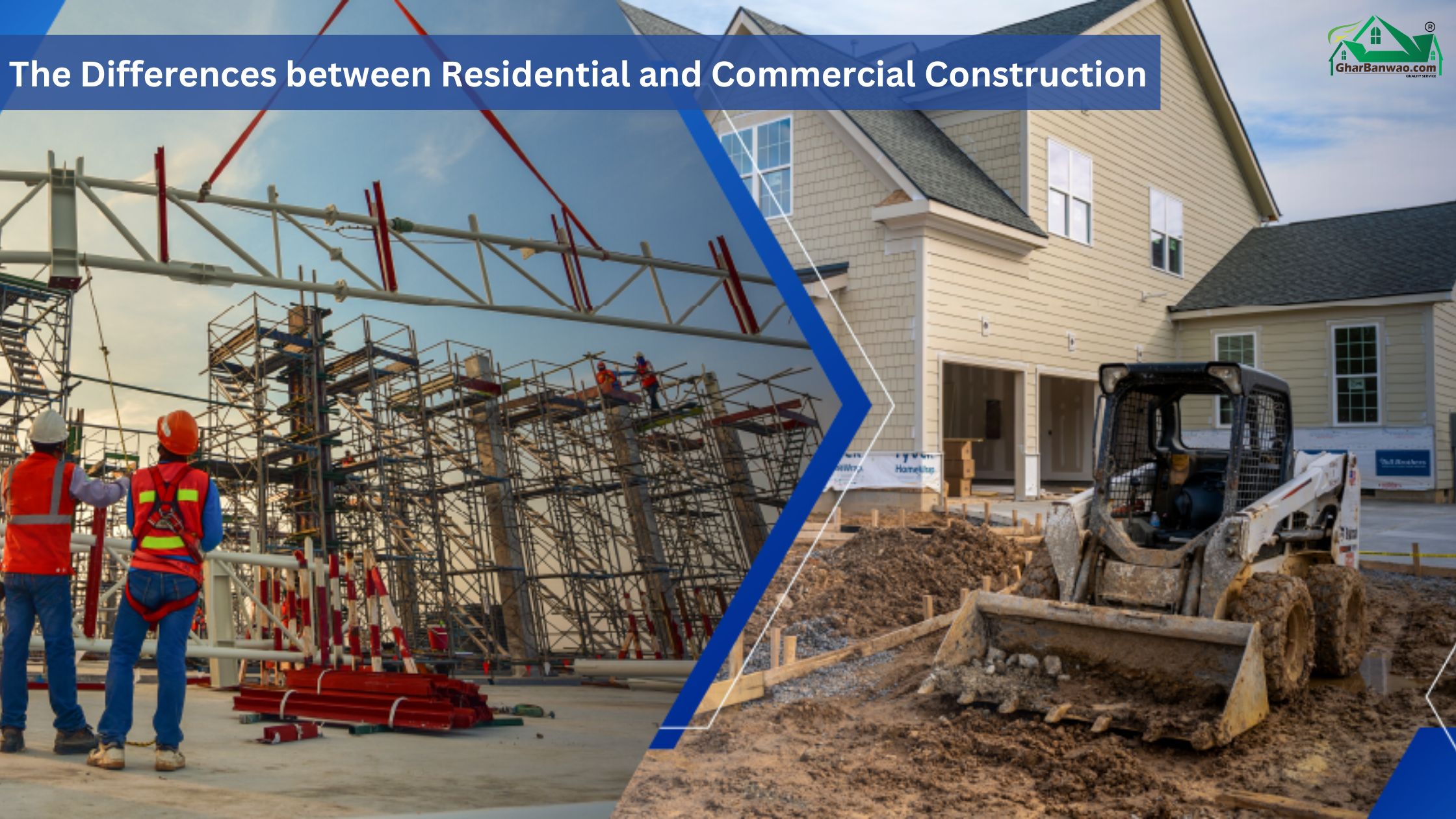Difference Between Residential and Commercial Construction
Residential and Commercial Construction differ in various aspects:
Purpose:
Residential construction involves building homes, apartments, or other dwellings for individuals or families to live in, while commercial construction involves erecting structures for business purposes such as offices, retails stores, hotels and warehouses.
Design and Layout:
Residential construction focuses on creating comfortable living spaces with bedrooms, bathrooms, kitchens, and living areas designing for occupants needs. Commercial storage areas, and facilities like restrooms and break rooms.
Building Codes and Regulations:
Both types of construction must adhere to building codes and regulations, but they often differ in specific requirements. Residential construction typically has more standardized codes related to safety, fire protection, and energy efficiency, while commercial construction may have additional regulations concerning accessibility, zoning, and occupancy load.
Materials and Construction Methods:
Residential construction commonly uses materials like wood, concrete, and bricks, with traditional construction methods such as stick framing or modular construction. Commercial construction often involves steel or concrete frames, curtain walls, and pre-engineered building systems for larger structures, emphasizing durability and long-term performance.
| "BEST BUILDER FLOOR APARTMENT IN CHENNAI" |
Timeline and Scale:
Residential projects tend to be smaller in scale and shorter in duration compared to commercial projects, which can involve larger teams, longer timelines, and more complex logistics due to the size and scope of the buildings.
Budget and Financing:
Residential construction may be financed by individual homeowners, often through mortgages or personal loans. Commercial construction projects typically require larger upfront investments and may involve financing from banks, investors, or commercial lenders.
Design:
Residential buildings are designed for comfort and privacy, with layouts featuring bedrooms, bathrooms, kitchens, and living spaces. Commercial buildings prioritize functionality and efficiency, often with open floor plans and designated areas for work or retail.
Construction Methods:
Residential construction often involves traditional methods like stick framing or modular construction, while commercial construction may utilize pre-engineered building systems, steel or concrete frames, and curtain walls for larger structures.
Project Management:
Both types of construction require project management expertise, but commercial projects often involve more stakeholders, subcontractors, and regulatory considerations, necessitating robust coordination and communication throughout the construction process.
Materials:
Residential construction commonly uses materials like wood, concrete, and bricks, while commercial construction may involve steel, concrete, glass, and composite materials for durability and aesthetic appeal.
Scale:
Residential projects are typically smaller in scale and scope compared to commercial projects, which can range from single-story retail buildings to multi-story office complexes.
Codes and Regulations:
Both types of construction must adhere to building codes and regulations, but residential projects often have simpler requirements related to safety, fire protection, and energy efficiency, while commercial projects may have additional considerations such as accessibility and zoning laws.
Construction Methods:
Residential construction often involves traditional methods like stick framing or modular construction, while commercial construction may utilize pre-engineered building systems, steel or concrete frames, and curtain walls for larger structures.
Timeline:
Residential projects tend to have shorter construction timelines compared to commercial projects, which can involve longer planning phases, permitting processes, and construction durations due to their complexity.
Budget:
Residential construction budgets are typically smaller and more straightforward, often financed by individual homeowners through mortgages or personal loans. Commercial construction projects require larger upfront investments and may involve financing from banks, investors, or commercial lenders.
Ownership:
Residential properties are usually owned by individuals or families for personal use or investment purposes, while commercial properties are owned by businesses or investors for profit-generating activities.
Tenant Considerations:
Commercial construction often involves considerations for future tenants, such as flexible floor plans, utility requirements, and zoning regulations, whereas residential construction is tailored to the needs and preferences of the homeowner.
Utility Systems:
Commercial buildings often have more complex utility systems, including HVAC, electrical, and plumbing infrastructure, to support the needs of multiple occupants or tenants, whereas residential buildings have simpler systems designed for individual households.
Amenities:
Residential construction may include amenities like private yards, swimming pools, or garages to enhance the living experience, while commercial construction may incorporate features like parking lots, elevators, or common areas to meet the needs of tenants or customers.
Accessibility:
Commercial buildings must comply with accessibility standards to accommodate people with disabilities, including features like ramps, elevators, and accessible restrooms, while residential buildings have fewer accessibility requirements.
Maintenance:
Commercial buildings typically require ongoing maintenance and management to ensure the smooth operation of business activities and the safety of occupants, while residential properties may have lower maintenance needs but still require regular upkeep.
Return on Investment:
Commercial construction projects are often evaluated based on their potential return on investment (ROI), considering factors like rental income, occupancy rates, and market demand, whereas residential properties may be valued based on factors like location, amenities, and resale potential.













